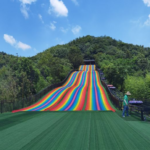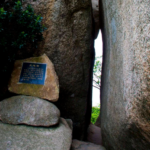Qishan Mountain is located 1.5 kilometers south of Guichi District. It is known as ‘equally charming as Mount Jiuhua and renowned in Jiangnan’. Qishan Mountain is less than 100 meters high and covers an area of about 5 square kilometers. The mountain stretches from west to northeast and reaches the shore of Baisha Lake. From a distance, it looks like a crouching tiger raising its head. Qishan Mountain is mainly characterized by karst landforms. There are dense clusters of rocks, caves, stones, gorges, springs, and canyons all over the mountain, forming a peculiar, deep, and diverse karst landscape. Surrounded by green mountains on one side and three lakes, the fresh and beautiful Qishan Mountain is arranged in a series of more than ten peaks. ‘The uneven peaks are like a surrounding screen, slanting and pressing down on the ten-mile green of the lake and sky.’ It is refreshing and delightful. With distant rivers and nearby lakes, surrounded by green and white, it not only contains the fresh, bright, poetic and picturesque scenery of Jiangnan, but also is rich in the simple and natural beauty of southern Anhui. The cultural landscapes here are also rich and colorful. Since the early years of Huichang in the Tang Dynasty, when Li Fangyuan, the prefectural governor of Chizhou, initiated the cliff inscriptions on Qishan Mountain. His successor, Du Mu, a poet in the late Tang Dynasty, built Cuiwei Pavilion on the western peak of Qishan Mountain in memory of Li Bai (in Li Bai’s poems about his visit to Qiupu in autumn, there is a line ‘Opening the curtain to face Cuiwei’). After climbing the mountain and entering the pavilion, drinking and composing poems, he wrote the excellent work ‘Climbing Qishan Mountain on the Ninth Day’. Since then, Qishan Mountain has been widely known at home. Tourists who come to trace its history, compose poems and odes, and enjoy the scenic views follow one after another. For thousands of years, among the scholars and generals who have visited Qishan Mountain, only ‘Records of Qishan Mountain Caves’ contains more than a thousand pieces of poems, odes, travel notes and inscriptions. Looking at the words ‘Return Our Rivers and Mountains’ on the stone wall, one can’t help but think of Yue Fei. In the first year of Shaoxing, when Yue Fei went north to resist the Jin army and passed by Qishan Mountain, he left behind the inscription ‘After years of dust on the military uniform, I specially come to seek beauty on Cuiwei. The beautiful mountains and waters are not enough to be seen. The horse’s hooves urge me to return by moonlight.’ ( ‘Cuiwei Pavilion in Chizhou’). There are many cliff inscriptions scattered on the steep rocks of the stone wall. Among them, the inscription of ‘Qishan Mountain’ by Bao Zheng in the second year of Zhihe in the Northern Song Dynasty is particularly magnificent.
The opening hours are from 08:00 to 17:00 all year round.
Qishan Mountain
Qishan Mountain is located 1.5 kilometers south of Guichi District. It is known as ‘equally ch[...]









